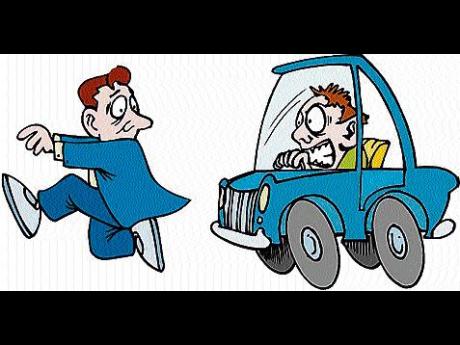Injured pedestrian denied compensation for crossing road
Cedric Stephens, Contributor
My husband was hit by a car on Hagley Park Road near to Three Miles, Kingston 11, on May 14. He was knocked unconscious and suffered injuries which were treated at the Kingston Public Hospital. His lawyer told him that he was entitled to compensation. However, the insurers of the car refused to pay because "he was wrong to cross the road". The lawyer now appears to be hesitant to pursue the claim. Why is my husband being treated worse than a stray dog? Can the car driver escape responsibility for her actions?
- D.S., Vineyard Town PO, Kingston.
HELPLINE: The text message that you sent me was, not surprisingly, very short on details. The additional information you provided when we spoke by telephone filled a few gaps. It was, however, not sufficient for me to find out exactly what occurred that evening when your husband was hit by the Caldina motor car.
The specifics surrounding the collision - for example, exact location, point of impact, time of day, vehicle speed, actions of the driver and your husband, road conditions, type of injuries your husband suffered and the damage to vehicle - are some of the things that determine which party is liable to pay compensation for the accident.
It is only after those details are collected and studied that a decision can be made about which of the two parties, the car driver or your husband, was responsible.
Vehicles that operate on public roadways are required to have insurance under The Motor Vehicle Insurance (Third-Party Risks) Act. Section 5 says: "In order to comply with the requirements of the Act, the policy of insurance must be a policy which ... insures such person, persons or classes of persons, as may be specified in the policy, against any liability incurred by him or them in respect of: (i) the death of, or bodily injury to, any person; and (ii) any damage to property, caused by or arising out of the use of the motor vehicle on the road."
Negligence is the trigger for getting compensation for personal injuries under motor policies. Your husband must prove that his injuries arose as a direct result of the car driver's negligence before he can become entitled to compensation.
Negligence, according to my Law Dictionary, is a "failure to exercise that degree of care which a person of ordinary prudence would exercise under the same circumstances". Ignoring road signs and traffic signals on the part of the car driver, for example, would be indicators of negligence on the part of the car driver.
Accidents are sometimes caused by the wrongful acts or omissions of two or more persons acting independently of each other. This is called contributory negligence. The insurers appear to have completely absolved the driver. They have also ruled out the possibility that your husband and the car driver may have contributed to the collision. Instead, they appear to be saying that your husband was solely responsible "because he was wrong to cross the road" - whatever that statement means.
It is probable that the insurer is playing a more complex game of hardball, hence their "he was wrong to cross the road." While there is no evidence that this is actually happening, it could be that they are subtly signalling that they are in no haste to compensate your husband. Their endgame could be to put the matter 'on ice' for years without paying a cent until such time that you and your husband forget about it or make a decision to abandon it.
I am very puzzled by the actions of your husband's attorney. Could it be that the prospect of the future financial reward is insufficient to motivate him/her to take action or, is there evidence which indicates that your husband was at fault?
Visit the Hunts Bay Police Station and obtain a copy of the police report. Study what it says very carefully. Next, sit down with your husband and try to recreate in detail all of the things that led up to the accident.
The goal here is to find out who is to be blamed. After this happens, you will be in a much better position to know whether to let go or to explore the possibility of using the Resident Magistrate's Court to seek legal redress.
Cedric E. Stephens provides independent information and free advice about the management of risks and insurance.aegis@flowja.comSMS/text message to 812-7233

